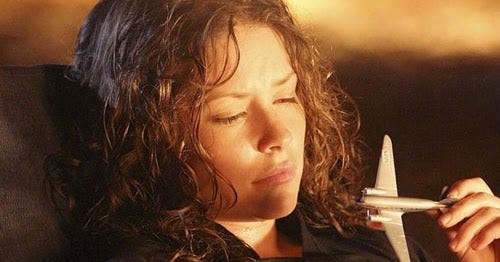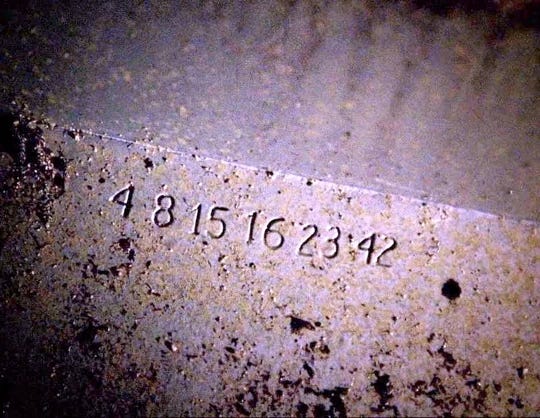I’m worried about the goats, y’all.
If you haven’t watched Severance — watch Severance. (And consider coming back to this article once you have, mild spoilers lie ahead.)
The series premise is killer: a group of office workers undergoes a surgical procedure that “severs” their memories — creating one self at work (the “Innie”), and one self outside it (the “Outie”). They become, essentially, two people sharing a body. Cool, right? Now make it a cult. Dress it in business casual. Add punitive hymns, sassy animatronics, waffle parties... That’s Lumon Industries. That’s Severance… And it’s outstanding.
Oh, and there’s goats. People love the goats.
Hot take: I think the goats were maybe — possibly — a creative misstep.
Big, giant, huge, flashing caveat here: I’m not in the Severance writer’s room (but I dream…), nor do I have unique insider information on the series plan — and it’s a safe bet that most or all of the writers and producers on that show have more experience than me. So, I’m airing this thought in an exploratory mood — I’m an outsider looking in, offering very nit-picky criticism on one of my favorite entertainment properties, ever. (I love you Ben Stiller, don’t be mad at me… why are you reading this?)
Anyway — In season one, Innies Mark S. (Adam Scott) and Helly R. (Britt Lower) venture into unfamiliar halls on the severed floor of Lumon, where they discover a man taking care of a bunch of adorable baby goats. They’re not ready, he says — visibly distraught. It isn’t time! … So, Mark and Helly leave.
And… that’s it… For season one, anyway. That earned a delightful, collective “what the f*&%??” from the audience, but one which — while obviously on the stranger side of an already strange office — felt relatively at home within the possibilities of this enigmatic company.
Then (three agonizing years later) season two came out, and we were given an expansion on the goats. Turns out, they’re part of another Lumon department — one that operates on a huge, indoor grazing field, where these goats roam and play, and the workers are bizarre, even by Lumon standards. They call this department: “Mammalians Nurturable.”
We’re introduced to the department early in the season — it’s a big part of the episode, and treated like a sizable reveal — and then it vanishes from the plot until the finale, when we learn the goats are a sacrificial ingredient in some big Lumon ritual. What the ritual is, exactly, we still don’t know. But the goat element boils down to a familiar trope — the sacrificial lamb. And just like that, one of the show’s biggest head-scratchers comes in for a smooth — if slightly underwhelming — landing.
Underwhelming objectively? Maybe not. This is still ritual animal sacrifice in a corporate setting — but when you introduce something as a wild mystery, the expectation — especially when left to simmer over literal years — is that the revelation will be equally wild. Goats being used for sacrifice is weird, but not really unheard of — it’s not a surprise, so much as a polite confirmation: the goats are for blood stuff. Cool.
If you loved the goats — if Mammalians Nurturable was your jam — I don’t fault you. For one thing, those goats are cute as heck. (I would die for Emile.) And as an audience member, you can’t deny the initial appeal of the discovery — when we’re used to clean white walls and business attire, a departure to dirty pastures and farm animals — even if / especially if they’re still indoors and under the same fluorescent lights — feels like an adrenal shot to your imagination.
But strictly from a writing perspective, I think the goats represent a tiny crack in what is otherwise a tight, near-perfect show. Bear with me…
The Attention Trap
I don’t know about you, but I frequently hear comparisons between Severance and Lost.
The parallel probably needs no explanation, but for the one of you who hasn’t seen either show — both series drop you into a strange, tightly-controlled environment and trickle in answers that only lead to more questions. Both series are famous for cryptic iconography and obsessive fan speculation. And both series’ worlds expand episode by episode, not just in scope but in meaning — as clues, flashbacks, and character moments slowly shift your understanding of everything that came before.
The similarities are there — and the comparison, I think, comes from a place of admiration and excitement. Fans love these shows. They love watching them, they love talking about them, they love wondering about them. But the comparison inevitably gets taken to its logical and literal end: Lost’s finale was famously divisive… Or hell, I’mma just say it — a lot of people really didn’t like it.
Some people liked it. Some other people were mad for all the wrong reasons (the survivors weren’t dead the whole time after all, you just weren’t paying attention). But for the most part, audiences just felt let down.
In retrospect, how could we not have been?
Lost — remember — was insanely unique for its time. In 2004, serial mystery TV, and “prestige TV” were barely a thing. YouTube did not exist — we weren’t devouring theory videos the same way back then. Lost was the pilot program for virtually every big high concept series that came after it — and it earned that spot by demonstrating the power of serialized mystery — for better and worse.
Creator and Executive Producer J. J. Abrams made “Mystery Box" storytelling famous — a style of writing that prioritizes intrigue above all. The box is the unknown, and the idea is: what’s inside doesn’t matter as much as the tension of not knowing. It’s less about immediate payoff, and more about building layers of intrigue. Surely answers are right around the corner.
They almost never are… But it keeps us coming back, doesn’t it?
It’s not a Mystery Box, it’s an “Attention Trap.”
Great for retention. Terrible for audiences — they’ve been invited along for a ride that’s speeding carelessly toward a brick wall. Not only would the best writers in the world struggle to keep so many plates spinning, they’d also have the ugly task of contorting every character’s internal landscape a hundred different ways just to make the latest twist make sense. (I’m looking at you that-one-episode-with-Kate-and-the-toy-plane.)
But the Attention Trap is not the result of some nefarious scheme from studios and networks — and I don’t believe it’s born from cynicism (at least not all the time). The Attention Trap isn’t something that’s set, it’s something fallen into — by writers and audiences alike.
“Wouldn’t It Be Cool If…”
You’re plotting your story, you’re proud of your themes, you like your characters — you just need a big shock moment. Or a good hook for an act-out. Or a cliffhanger that’ll guarantee you a second episode — so you start “blue-skying.”
[Blue Skying is a term for pitching in the earliest days of a writer’s room, when no ideas are off limits. “Any idea in the big blue sky is welcome.”]
To get the juices flowing, you step (momentarily) away from “what would my character actually do in this situation?” and open yourself to any and all possible actions or discoveries or outcomes — you’ll figure out the how and why later.
This is where the big left-field swings come in. Wouldn’t it be cool if there was, like, a monster on the island? Wouldn’t it be wild if they found a buried hatch? How crazy would it be if they found, like, baby goats in one of the offices??
And here’s the thing: a lot of good ideas start with nothing more than “Wouldn’t it be cool if…” — you could argue that’s what an idea fundamentally is. I’m not judging this part of the process. Imagination isn’t linear, and the idea often hits before the justification. Writing is messy. And if anyone tells you otherwise, they can devour feculence.
It’s just — the “trap” is deceptively close to this question. Because “Wouldn’t it be cool if…” is a ways off from “wouldn’t it be meaningful if…” — that’s a connection that’s all-too-often forgotten or neglected when it comes to putting the big idea into practice.
Whether they know it or not, an audience can feel that.
“So Why Do You Hate Severance?”
Okay... It is— look at me— it is my favorite show on television. If I could write for Severance, or create something half as smart and stylized, that’d be a career peak. I love it that much. Which is why I care enough to poke at this.
Because the goats? They’re fine. They don’t break the show. They make enough sense. It’s just…
I’m fairly positive the goats exist in Severance for the mere reason that they were unexpected. There was no preexisting lore to explain their presence — and no plan for their role going forward. (Dan Erickson has changed his tune on this once or twice in interviews — which may be part of his intention to hide spoilers, or a misunderstanding on my part, and if so, fair play.)
And — again — the goats are unexpected, and therefore full of potential. But now that they’re here, they need to be justified. And the longer you take to justify them — the longer an audience stews on the possibilities — the bigger and better your reveal has to be.
Are sacrificial goats “big” enough? Probably differs from viewer to viewer. But from what I can tell, there’s a good-sized chunk of the Severance audience that feels the payoff didn’t quite match the buildup.
And that’s the rub. That’s the Attention Trap.
I Don’t Know Anything
I want to be clear here: I’m not saying the baby goats of Severance were an outright bad creative decision. The show isn’t over — and the writers have more than earned some trust. I am prepared — eager even — to eat my words. I’m just worried the goat thing might be an early symptom of the same kind of problems that befell Lost. The same problems that have plagued a lot of shows I care about.
Mystery is a powerful thing — a potent drug for audiences and a shortcut to investment for writers. But mystery without follow-through starts to corrode that investment. It makes characters feel like pawns. It reshapes theme around plot (or throws theme out the window entirely). It slowly turns a story with soul into a game of narrative Three-card Monte — and you wind up going down in history as that-show-that-biffed-the-landing.
Mysterious twists and unexpected hooks aren’t the enemy. But chasing the next big reveal — instead of the next honest moment — might be.
But that’s my take. What say you?
Have you watched Severance? How do you feel about the goats? How do you feel about mystery boxes? And what’s your favorite episode of LOST? Drop a like or a comment, and let’s keep the conversation going…












